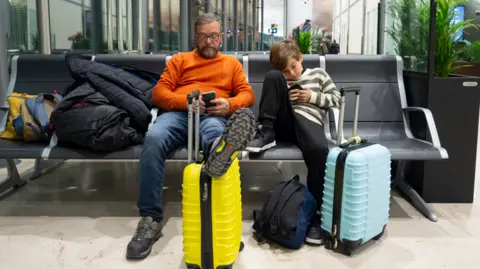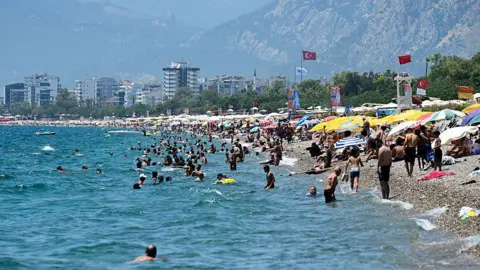Smart Savings for Your Summer Holiday: Expert Tips to Beat Rising Costs
Unlock Your Dream Summer Holiday: Savvy Savings for 2025
As the summer holidays approach, the prospect of a much-needed getaway is exciting. However, recent trends indicate a significant rise in the cost of package holidays, with all-inclusive family trips to popular destinations seeing notable price increases over the past year. For many families, the dream holiday may seem just out of reach. Fortunately, with strategic planning and a few insider tips, it’s still possible to enjoy an international escape without breaking the bank. This guide delves into six effective ways to reduce your summer holiday expenses.

1. Strategic Booking: Target Early or Late Season
The timing of your booking can significantly impact the final price. For those planning a summer holiday, especially during the peak months of July and August, booking well in advance is often the key to securing better rates. This period is highly sought after not only by British holidaymakers but also by travellers across Europe, leading to increased demand and higher prices for accommodation and flights. As Sean Tipton from The Travel Association (ABTA) explains, hotels often increase their prices during these popular months. Consider the shoulder seasons – June or September – for a potentially more budget-friendly experience. If a summer holiday during the peak season is non-negotiable, Tipton advises booking as early as possible to mitigate potential price hikes.
2. Optimize Travel Dates: Mid-Week and Early Bird Flights
When it comes to air travel, the day of the week and time of day can play a crucial role in cost savings. Flying mid-week, typically on Tuesdays or Wednesdays, is often considerably cheaper than travelling during the weekend. This is because demand is lower, reflecting the preference of many travellers to depart and return on Fridays, Saturdays, or Sundays. Similarly, early morning flights, while requiring an early start, can offer substantial savings. As Tipton points out, flights at less convenient hours are less popular and therefore priced more competitively. Even small adjustments like choosing a flight that departs at 6 am instead of a more typical mid-morning slot can lead to lower fares.

3. Last-Minute Deals and Alternative Accommodations
For the flexible traveller, last-minute deals can present excellent opportunities for savings. Tour operators and travel agents often have unsold room blocks or package deals that they discount heavily as the departure date nears. This is to recoup some of the costs rather than incur a total loss. If you have the flexibility to travel on short notice, keeping an eye on last-minute offers from reputable travel agents can yield significant discounts. Beyond traditional packages, consider alternative accommodation options like house swapping. Platforms like Kindred connect homeowners globally, allowing them to exchange homes for a nominal service and cleaning fee, eliminating the need for hotel or villa rental expenses. However, caution is advised when exploring last-minute deals, particularly those advertised on social media. Consumer expert Jane Hawkes warns of potential scams, where enticing images of desirable locations are used to trick unsuspecting travellers. Performing a reverse image search on the advertised property can help verify its authenticity and prevent falling victim to fraudulent offers.
4. Smart Currency Exchange: Prioritize Local Currency
Managing your money effectively while abroad can lead to considerable savings. Alastair Douglas, CEO of TotallyMoney, advises against exchanging currency at airports, which typically offer the least favourable rates. It’s more cost-effective to exchange money in advance or use cards that allow you to pay in the local currency. This often results in better exchange rates than those offered by bureaux de change. If you’re concerned about fluctuating exchange rates, a strategy of exchanging half your currency in advance and the remainder closer to your departure can help mitigate risk. Furthermore, when using cards for purchases abroad, always opt to be charged in the local currency rather than your home currency. This typically provides a more favourable exchange rate, saving you money on every transaction.
5. Baggage and Boarding Pass Management
Pre-travel preparations can also help avoid unexpected airport fees. Printing your boarding pass before arriving at the airport can save you from potential charges levied by some airlines for printing it at the check-in desk. Nicky Kelvin, editor at The Points Guy, highlights this as a simple yet effective cost-saving measure. Additionally, pay close attention to baggage allowances, both in terms of weight and size, especially for carry-on luggage. Airlines often have strict regulations, and exceeding these can result in hefty fees to check your bag into the hold. It’s wise to document the airline’s specified luggage dimensions from their website. If your bag is measured and found not to comply despite adhering to the stated dimensions, document the situation and consider making a formal complaint afterwards.
6. Airport Shopping: Buy Essentials in Advance
Airport retail prices for items like toiletries and snacks can be significantly higher than those found in regular stores. To combat this, consider purchasing essentials like sun cream and travel-sized toiletries online in advance. Many retailers offer the option to order online and pick up your items in-store at the airport after you have cleared security. This not only helps you avoid the 100ml liquid restrictions that still apply at most UK airports (though some, like Edinburgh and Birmingham, are relaxing these rules) but also allows you to take advantage of cheaper online pricing. Kelvin also suggests bringing a reusable water bottle to utilize free water refill stations available in most airports and packing your own snacks, especially beneficial for families travelling with children, to avoid inflated airport food prices.



Post Comment